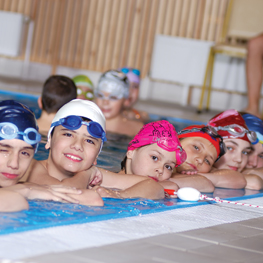
The Red Cross estimates that over 90 per cent of families spend at least some time in the water during the summer months, so it makes sense that summer is the prime season for children’s swim lessons. But don’t be so quick to pull your kids out of the water just because the temperature has fallen outside.
“I’m a big proponent of year-round swimming at least until it becomes like riding a bike,” says Coach Ruthie Zarren, a certified swim instructor, water safety educator and owner of Little Fishes Swim School.
“Being in the water and swimming safely should be second nature for every child, but kids are rarely able to develop the skills they need when they only spend a few months of the year in the water.”
Surprised that now might be the right time to sign your child up for swim lessons? Consider the following ways in which kids can benefit when they ‘just keep swimming’ throughout the winter season.
Winter swim lessons build the skills kids need to stay safe in the water
According to a 2009 study from the Archives of Pediatrics and Adolescent Medicine, formal swim lessons can significantly reduce the risk of drowning, particularly in children between the ages of one and four. And while summer class will certainly help to build the strong swimming and water safety skills kids need, year-round lessons allow them to better retain those skills - and move on to mastering more advanced skills faster.
“I like to use the analogy of playing an instrument,” says Aquatics Director Kyle Fetick.
“You wouldn’t expect to take piano for a few months out of the year and be a proficient pianist. Swimming is very much the same. While it may be a typical summertime activity, the more you learn in the winter and in the Spring, the more prepared you are to be a confident and safe swimmer during the summer.”
Winter swim lessons keep kids active
Health Canada recommends that children and youth accumulate at least 60 minutes of physical activity per day. But parents often struggle to keep kids active, particularly during the winter months, when colder temperatures and fewer hours of daylight limit outdoor playtime and lead to a more sedentary lifestyle. Weekly swim lessons provide built-in insurance that children are going to get moving (and splashing) on a regular basis.
Swimming works most of the body’s major muscle groups and carries a low risk of injury, making it an excellent form of exercise for growing children. And since swimming is an activity that most kids enjoy, they are likely to jump into the pool without protest.
Winter swim lessons can cure cabin fever
It’s common for children (and adults) to become bored and restless during the long winter months. Indoor activities like reading and playing video games can only provide so many hours of entertainment before kids feel the urge to run and jump and play, and parents begin to feel like they are going to lose their minds. When it’s too cold to head to the playground, a trip to an indoor pool makes for the perfect escape.
During swim lessons, kids get to expend all of the excess energy that builds up after too much time spent indoors. They have an opportunity to see their friends, interact with their teachers and move their muscles as much as they need. Once class is over, they should be ready to rest - or at least play quietly - upon returning home.
Bottom line: routine winter swim lessons keep kids moving, and also allow them to develop the strong swimming skills needed to stay safe in the water. Maybe even more importantly, they give the entire family a reason to get out of the house - before cabin fever sets in.
Where your family can swim this winter
There are many indoor facilities that offer group or private swim lessons throughout the winter. Even if you choose not to sign your kids up for classes this winter, an indoor pool is still the perfect place to take the family when it’s too cold to play outside.
Look for winter swim opportunities at the following locations in your area:
Private swim school with an indoor pool
A local high school or community college or university (especially one with a swim team)
A private fitness club
A nearby community or recreation centre
Alyssa is a freelance journalist and mother of two. In an effort to avoid cabin fever, she and her children spend much of the winter at their local indoor pool.
Calgary’s Child Magazine © 2024 Calgary’s Child